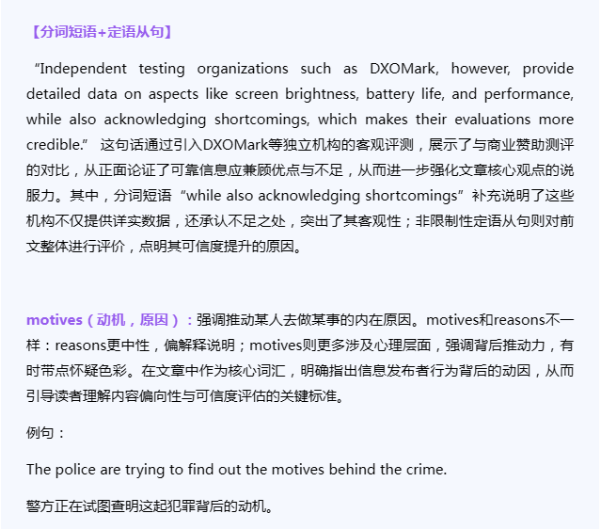支招托福作文 | 学术讨论范文(59)
完整版范文内容来啦
Question
2025年6月28日托福学术讨论真题
题目
Your professor is teaching a class on communication. Write a post responding to the professor’s question.In your response, you should do the following.
• Express and support your opinion.
• Make a contribution to the discussion in your own words.
An effective response will contain at least 100 words.

Kelly
If I need to be sure information is accurate, I consult scholarly, peer-reviewed sources like academic journals. If other experts have reviewed the information and approved it, then I know it is likely to be reliable. If I have any doubts, I can always ask my professors.
Andrew
While I agree with Kelly to an extent, not all the information you need is available in academic journals. If I need more general information online, I consider the source. Who posts the information to the site? Do they have anything to gain from presenting inaccurate information? For example, are they selling a product related to the topic? Asking these kinds of questions is important.
范文正文
When assessing the accuracy of online information, examining the creator’s motivesis of vital importance. The reason is that much of the content we encounter is not entirely objective, but shaped by commercial interests or hidden agendas. Take the example of someone searching for “the most effective vitamin C.” Certain online articles may enthusiastically promote a specific brand, claiming it can “boost your immune system and prevent colds,” and even attach a purchase link with a discount code. Clearly, such content serves more as advertising than as objective guidance.【比较结构+平行结构】In contrast, a report from a consumer association that compares several products is far more trustworthy. The same principle applies to technology reviews. On YouTube, for instance, a reviewer might begin a video by announcing, “This video is sponsored by Brand X,” and then focus mainly on the strengths of the phone while underplaying or omitting its weaknesses.【直接引语+分词短语】Independent testing organizations such as DXOMark, however, provide detailed data on aspects like screen brightness, battery life, and performance, while also acknowledging shortcomings, which makes their evaluations more credible.【分词短语+定语从句】Therefore, when determining whether information is accurate, individuals should not only examine what is said, but also why it is being said and who stands to benefit.
写作思路和特色
这道题是2025年6月28日上午场B套托福学术讨论写作真题,也是托福考试中反复出现的学术讨论写作题目之一,出现在2024年10月27日。在这一道开放式题目中,教授询问:当在网上查找信息时,判断信息是否准确和真实的方法是什么?Kelly认为应当参考学术性的、经过评审的资料,比如学术期刊;由于这些信息经专家审查并得到认可,因此很可能是可靠的。而Andrew则认为人们需要的信息并不都能在学术期刊中找到;方法是考虑信息的来源,并提出各种问题,这一点非常重要。
这篇文章采用了“个人观点+因果论证+举例论证+总结”的写作结构,从网络信息真实性的角度切入,强调在判断信息是否准确时,考察信息发布者的动机至关重要。文章首先指出,许多网上内容并非完全客观,而是受到商业利益或隐含目的的驱动。接着,文章通过维生素C的案例展开:有些文章极力推荐某一品牌,宣称能够增强免疫力、防止感冒,并附带折扣购买链接,这类信息明显更像广告而非客观指南;相较之下,消费者协会发布的对比报告则因涵盖多个产品而更具可信度。随后,文章又以科技测评为例进一步论证:在YouTube上,一些科技产品的评测视频会在开头声明“由某品牌赞助”,但往往着重突出手机优点而弱化或忽略其缺点;而独立机构DXOMark则会提供详细的客观数据,如屏幕亮度、电池续航和性能表现,并指出不足之处,因此其评价更可靠。最后,文章总结道,判断信息是否准确,不能只看说了什么,更要关注为什么这样说以及谁从中受益。
整体来看,文章语言清晰流畅,案例生动具体,能够很好地支撑中心论点;逻辑上先提出观点,再辅以不同领域的对比实例,最后回扣总结,展现了结构严谨、论证充分的写作特点。
用词用语整理
【比较结构+平行结构】
“Clearly, such content serves more as advertising than as objective guidance.”
这句话在文章中起到承上启下的作用,通过点明前文维生素C案例的实质是广告而非客观信息,强化了信息动机影响准确性的论点,并为后续科技测评的对比分析作铺垫。其中,比较结构“more…than…”通过对“advertising”和“objective guidance”的对照,突出了该内容的本质偏向广告而非客观指导,从而强调其非客观性;同时,平行结构在“as advertising”与“as objective guidance”两个并列的介词短语间形成对称,使句子简洁明了,逻辑关系鲜明。
【直接引语+分词短语】
“On YouTube, for instance, a reviewer might begin a video by announcing, “This video is sponsored by Brand X,” and then focus mainly on the strengths of the phone while underplaying or omitting its weaknesses.”
这句话通过具体呈现YouTube测评中因商业赞助而导致的偏颇现象,直观地说明了信息发布者动机如何影响内容客观性,从而有力支撑了文章的核心论点。其中,直接引语“This video is sponsored by Brand X”真实再现了测评者的开场用语,使论证更具画面感和说服力;而分词短语“underplaying or omitting its weaknesses”则对前文“focus mainly on the strengths of the phone”进行补充说明,具体展现了偏颇表现,也提升了句子的层次感。

be of vital importance(极其重要,至关重要):be of vital importance相当于be very important,但语气更正式、更有力度,常用于学术写作、演讲、正式报告中,后面通常接具体的事情/方面。在文章中强调考察信息发布者动机在判断网络信息准确性中的关键性作用。
例句:
Protecting the environment is of vital importance for sustainable development.
保护环境对可持续发展来说至关重要。
hidden agendas(隐藏动机,秘密目的):agenda本意是议程、日程安排,但在比喻义里,常指动机、目的;hidden agendas就是隐藏的目的或企图,指一个人表面上说或做的事背后,另有不可告人的目的,通常带点负面意味。在文章中用来强调信息背后可能存在的隐秘目的或利益,从而揭示内容不完全客观的原因,支撑了文章关于评估信息可信度需关注动机的核心论点。
例句:
She pretended to support the plan, but her hidden agenda was to gain more influence in the company.
她假装支持这个计划,但她真正的目的却是为了在公司里获得更多影响力。
enthusiastically(充满热情地,积极投入地):副词,一般用来修饰动词,强调做某件事时热情的、充满激情的态度和情绪。在文章中强调某些网络文章对特定品牌的过度推崇态度,突出其宣传性质,从而支持文章论证网络信息可能带有商业偏向的观点。
例句:
The students answered the questions enthusiastically.
学生们积极地回答问题。
attach(附上,附加):意思是把某物固定、附在另一物上,引申为附上、使依附、使有联系。在日常生活和工作里,最常见的场景是发邮件时附上文件。在文章中用于描述将购买链接附加到推荐内容上,具体体现了信息传播背后的商业意图。
例句:
I attached the photo to the application.
我把照片附在申请表上。
consumer association(消费者协会,消费者组织):通常是代表消费者利益、监督商品和服务质量、维护消费者权益的机构,常用在新闻报道、正式文章里。在文章中用来引入权威、独立的机构组织,与商业推广形成对比,从而支持文章关于可靠信息应来源客观机构的论点。
例句:
Many consumer associations provide advice on how to choose reliable products.
许多消费者协会会提供如何挑选可靠产品的建议。
the same principle applies to(同样的道理也适用于……,这一原则同样适用于……):常用来类比或延伸说明,把前面提到的规律、规则套用到另一种情况中。在文章中起承上启下作用,将前文关于评估信息动机的论点延伸到科技测评领域,体现观点的普遍适用性。
例句:
If you want to learn English well, you need to practice every day. The same principle applies to learning the piano.
如果你想学好英语,你需要每天练习。学钢琴也是同样的道理。
sponsored(被……资助):sponsor意思是资助、赞助、发起、支持某个活动、项目或人,强调出钱、提供资源或支持以帮助某件事情发生。在文章中用作被动语态,揭示测评内容背后的商业资助关系,说明信息可能存在偏向性,从而强化文章关于动机影响信息可靠性的核心论点。
例句:
Many athletes are sponsored by sports brands.
许多运动员都由体育品牌赞助。
underplaying(淡化,轻描淡写):低估某事的重要性或严重性,强调把某件事表现得没有实际情况那么重要或严重。在文章中用来描述测评者有意淡化产品缺点的行为。
例句:
The politician underplayed the risks of the new policy.
这位政治家淡化了新政策的风险。
omitting(省略,不提及):常用于正式写作或报告中,可以表示有意识地不写或不说某些东西,也可以表示不小心遗漏。omit强调未包含或未提及,不一定带有意图,但在某些语境中可能有故意的意思,比如在文章中用来强调测评者故意忽略产品缺点的行为,与underplaying共同突出信息呈现的不完整和偏颇,从而支撑文章核心观点。
例句:
The teacher noticed he was omitting some important details in his essay.
老师发现他在作文中省略了一些重要细节。
acknowledging(承认,认可):承认某件事实、情况或观点是真实的、存在的。acknowledge是学术写作中常用的表达方式,用于客观呈现事实或观点,不一定是赞同,只是确认其存在。在文章中用来强调独立机构在评测中对产品不足的坦诚说明,与科技评测视频形成对比,突出其客观性和可信度。
例句:
The report acknowledges the potential impact of climate change on agriculture.
这份报告承认气候变化可能对农业产生影响。
credible(值得信任的,可靠的):通常用来形容信息、证据、消息来源、论点等,可以相信其真实性或可靠性。在文章中用来评价信息来源的可靠性,强调只有兼顾优缺点、客观呈现的内容才值得信赖,从而强化文章关于评估信息可信度的核心论点。
例句:
The scientist provided credible evidence to support her theory.
这位科学家提供了可靠的证据来支持她的理论。
stands to benefit(很可能从……中受益,有机会获益):常用于正式或书面语,强调潜在的好处或机会,而不是已经发生的事实,主语可以是人、组织、群体甚至国家。在文章中用来重申关注信息发布者可能从中获利的事实,从而强调评估动机在判断信息可信度中的重要性。
例句:
Small businesses stand to benefit from the new tax policy.
小企业很可能从新的税收政策中获益。
免费领取资料
0元领取剑桥雅思系列真题解析、托福TPO、SAT考试真题,更多独家资料免费领取。
1.扫二维码领取

2.表单领取:姓名+电话+备注想要资料,24小时内老师会及时与您联系
推荐阅读
- 支招托福作文 | 学术讨论范文(64)
- 支招托福作文 | 学术讨论范文(63)
- 支招托福作文 | 学术讨论范文(62)
- 支招托福作文 | 学术讨论范文(61)
- 支招托福作文 | 学术讨论范文(60)
- 支招托福作文 | 学术讨论范文(59)
- 支招托福作文 | 学术讨论范文(58)
【本文标签】:
【责任编辑】:无锡新航道小编 版权所有:转载请注明出处

